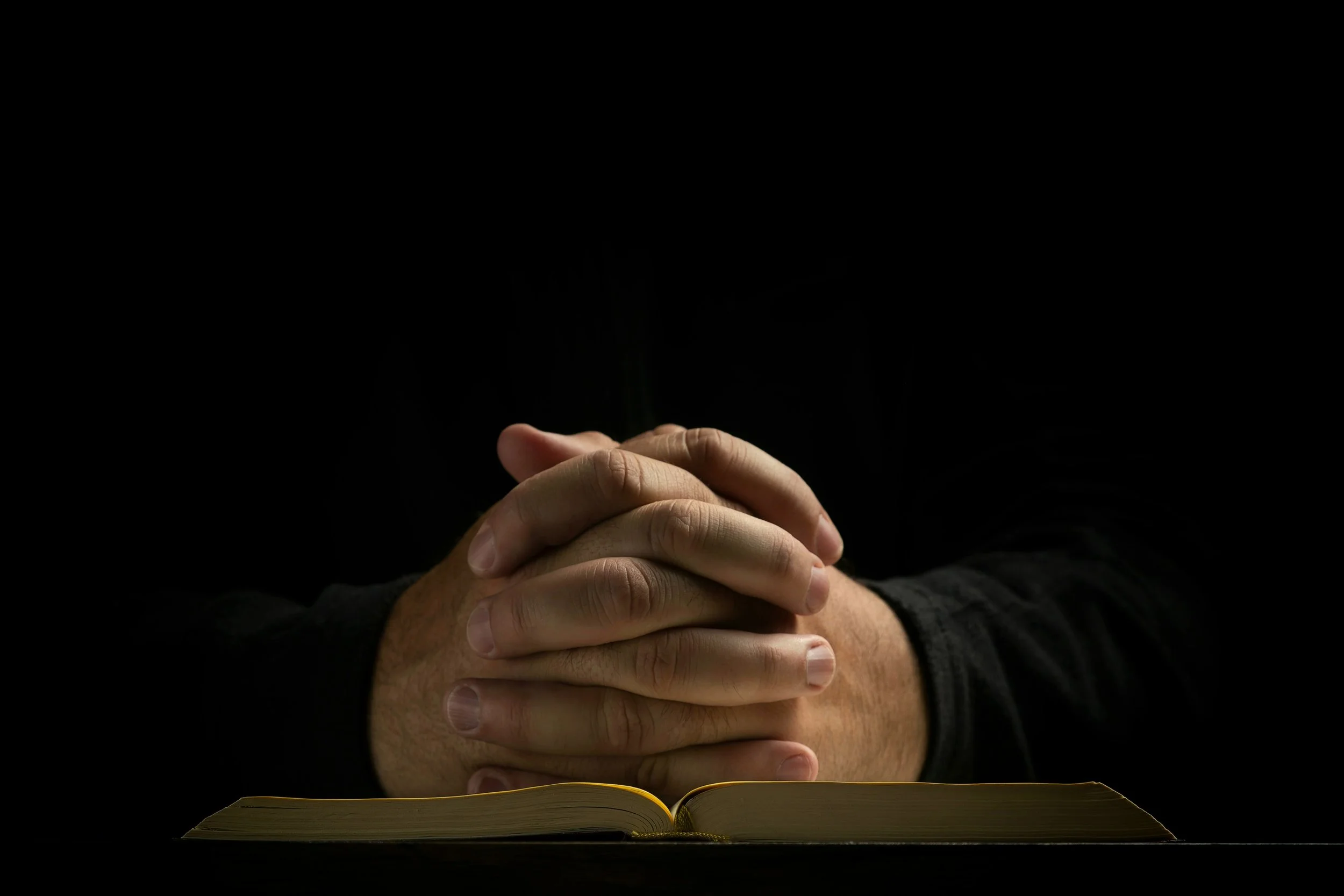This post is about a way to approach contemplative prayer. I freely admit from the outset that I am no master of this art of ultimate trust in God’s love for me. Almost twenty years into my journey as an Anglican and over thirty into my life as a Christian, I am still unlearning the engrained habits of self-sufficiency.
Read MoreThis Lent, I am revisiting Martin Laird's remarkable little book, Into the Silent Land, as an aid to my contemplative prayer practice. For me—and I imagine I speak for many who have gone through St. Matthew's Pastoral Ministry class—Into the Silent Land was my first introduction to the Christian tradition of contemplative prayer.
Read MoreBe quiet and listen. What do you hear? Do you hear an aircraft overhead? Vehicles in the street outside? The air conditioning? Can you hear the compressor on the refrigerator? The fan of the computer? Most of the time these sounds fade into the background, but it’s amazing how acute one’s hearing gets when you sit down and attempt to pray. Especially when you attempt Contemplative Prayer.
Read MoreEASTER, the Day of the Resurrection, is the most important celebration of the Church. From the beginning, the Church observed a period of fasting before Easter to prepare for the feast. This season of fasting was lengthened to forty days to correspond to the forty day fasts in the Bible: The fast of Jesus in the wilderness before he was tempted by the devil (Matt. 4:1), the fast of Moses on Mt. Sinai while he was receiving the Ten Commandments (Exodus 34:28), and the fast of Elijah when he fled from Jezebel (1 Kings 19:8).
Read MoreGetting back into a rhythm is a difficult thing. When I wrote frequently for our blog last year, the process of sitting down to put thoughts to paper was routine, familiar, and often easy. I developed a liturgy that suited me well and allowed writing to be a prayerful exercise. Yet, after a five-month hiatus for the birth of my daughter, I find myself struggling to make my fingers type. It’s not that I don’t have things to say, but rather that the time away has dulled the familiarity of the liturgy. What was once a discipline of stillness to center my thoughts and prayers well enough to write has become once more a laborious struggle to remember how to be still. It’s much easier to let other things take away my time, and I find myself making excuses that other things are more important than this more cumbersome task at hand. It feels like I’m starting over.
Read MoreWe’ve considered the necessity of self-death through Christ in the life of the Christian artist. What’s next? What is the point of this self-death? Where does it go? Does my story, my particular identity, matter at all in my artistic practice?
Read MoreThe Rosary is a longtime church tradition. It began in the 9th century in various forms, until it was revealed to St. Dominic in 1221 A.D. by Mother Mary herself. From then on, through his religious order of the Dominicans, the Rosary was promoted and encouraged for all Christians.
Read MoreSince last year, Timothy Lawrence and I adopted the tradition to read and discuss Dante’s Divine Comedy throughout the Lenten fast. This reading course was outlined by Fr. Hayden a few years prior for his students at Pacifica. As if enduring the silence and temptations of Lent are not enough, adding a medieval poetry epic about the 9 circles of hell, 7 levels of purgatory, and 9 spheres of heaven to that is a good penance. During the first few chapters, there is an emphasis on losing the way. As I mentioned in last week’s blog, Lent reveals much about ourselves. Our fears. Our worries. Our anxiety.
Read MoreIt sometimes surprises new practitioners of Lenten disciplines when they do the math and find that there are not forty but forty-six days between Ash Wednesday and Easter Sunday. How do we account for the additional days? It is then that they learn of Sunday as a blessed relaxation of the Fast in observance of our weekly remembrance of the Lord’s Day of Resurrection. The Lenten Sunday puts a point on what is true of every Sunday: it is both a looking back and a looking forward. It is a perpetual memorial of Easter until Christ returns to raise and judge the quick and the dead.
Read More“In December 2016, I watched one of the most emotionally intense and scarring movies of my life on the big screen that had me questioning parts of my faith. This movie was Silence, written and directed by Martin Scorsese. Based on the novel by Shusaku Endo, Silence follows two Jesuit Priests, Fr. Rodrigues, and Fr. Garupe, leaving their home in Portugal to bring the Gospel to Japan and to discover the whereabouts of a well-known Priest who committed apostasy. Throughout the film, the themes of silence, despair, and hope appear and reappear. The scene that never left my mind was one during one of Fr. Rodrigues’ prayers.”
Read MoreIn storytelling, crossing the threshold is essential for character development. It is the protagonist saying “yes” to the journey ahead as they leave their comfort zones to venture off into the unknown, unsure of what is out there or who they will meet. As Bilbo Baggins himself puts it in this same scene from the Fellowship of the RIng, “It's a dangerous business, Frodo, going out your door. You step onto the road, and if you don't keep your feet, there's no knowing where you might be swept off to.”
Read MoreLike all real and good things that take practice, prayer doesn’t always come easily. In fact, as we grow in prayer, we can expect to have seasons where it is downright difficult to pray. There are a lot of reasons for this. When the newness of a habit begins to wear off and we settle into a pattern, we begin to experience new challenges to our disciplines of prayer. It is important for us to remember that difficulties in prayer are not necessarily a sign we are doing something wrong. In fact, experiencing difficulty in prayer can be a sign that we are doing exactly what we need to do. Here are some of the common difficulties that face a person who is learning to pray:
Read MoreIn his Voyage of the Dawn Treader, C.S. Lewis tells the story of a young boy named Eustace Clarence Scrubb who, through habitual self interest and a careless fixation with a dead dragon’s hoard of gold, becomes a dragon himself. When the dragon-boy encounters the Christ-figure of the novel, the great lion Aslan, Eustace is informed that in order to become ‘un-dragoned,’ he will have to wash off the dragon skin in a nearby well. Eustace sets to work, and begins to scrub layer after layer off of himself, diminishing his dragonish stature until he reaches one final, intractable layer of dragon-skin that scrubbing cannot remove.
Read MoreWe have faced the blank page. We have attended to silence. And we have accomplished an incredibly brave thing: we have gotten something on the page. It is not blank anymore—we are free to keep working toward a finished piece, whatever that might be, however many drafts it may take us to get there. We have committed to the creative act, and to whatever it may show us as we follow it through.
Read MoreWe have practiced silence. We have listened for the voice of the Spirit. We have put pen to paper, brush to canvas, spade to soil, knitting needles to yarn. Now what?
Read MoreIn the next three blog posts, we will consider what I call “the creative act.” Before we dive in, let’s ask a question that may seem obvious: What is the creative act?
Read MoreIn this series of posts, we will consider the vice of ‘sloth,’ one of the more misunderstood among the vices. Before we focus on this vice in particular, though, we do well to look at what place the categories of the ‘seven (or eight) deadly (or capital) vices’ have in the Christian life. These are not a list found in the Scriptures–they do not have the same evident clarity as the Ten Commandments, the Summary of the Law, or the Beatitudes. Nevertheless, this list emerged immediately after the great persecutions ended and Christians began to have time and space (and longevity) to study and explain methodically the spiritual work of the Christian life.
Read MoreTomorrow is Trinity Sunday, and I can’t help but hear in my head the rock n’ roll classic hit, “Here I Go Again” by Whitesnake. Don’t mock me–it will forever and always be a rock and roll classic that will survive the ages and instantly bring me joy when I hear it. Just in case you’re not a regular listener of the “80’s on 8” Sirius XMU channel, to refresh your memory, the song opens with these lyrics:
Read More



















